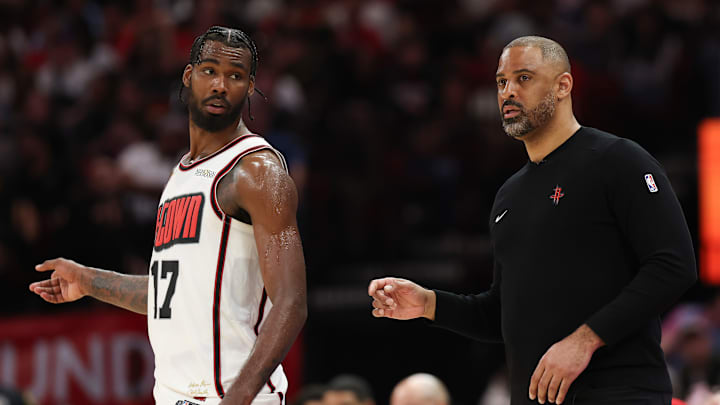As the Houston Rockets navigated this offseason, they were largely lauded for the number of savvy signings they made to bolster their depth in the frontcourt and lean even more directly into the size advantage that had defined their defensive front last season.
However, as the offseason drew to a close, the Rockets were ultimately unable to sign Tari Eason, who will be a restricted free agent next offseason, to a contract extension, meaning that Eason will be free to hold the organization in a stand-off if he so chooses
Moreover, according to NBA Analyst Brian Windhorst on yesterday's episode of The Hoop Collective, Houston made a rather strong offer to Eason before talks ultimately fell apart. While the exact terms of that offer remain unclear, Eason demanding much more than $20-$25 million a year he is worth would be a highly concerning prospect for the organization's ongoing financial flexibility.
Tari Eason could want more than the Rockets can realistically afford to give him
Even up until the last moments of the offseason, it certainly seemed as though extending Eason was a top priority for the organization. They had already extended both Alperen Sengun and Jabari Smith Jr. long-term, and Eason was the next piece they needed to collect to keep their young core together.
According to Windhorst, this sentiment was apparently reflected in their offer to Eason. Windhorst claims that Houston offered Eason a contract in excess of $100 million.
Through Eason's three seasons in the NBA, he has become one of the most beloved players on the Rockets both by fans and by the coaching staff, averaging 10.3 points, 6.3 rebounds and 1.2 assists through 162 career games.
While Eason has primarily taken on a bench role throughout his career, and has had his fair share of health problems, he has proven to be a vital player to Houston's rotation, and, for the most part, he deserves to earn his fair value on his rookie extension.
Yet, even with Durant accepting $30 million below the max across the course of the two year extension he signed before the season started, the team cannot afford to pay Eason much more than what Smith Jr. earned on his rookie extension.
They still need to extend Thompson, and, moreover, they will still need to add pieces in the upcoming offseasons in order to ensure that this team is ready to contend.
While it is still unclear why Eason ultimately declined the deal, and it could have been for a reason other than the figure Windhorst specified, this could be a disastrous sign for the Rockets if Eason has lofty demands next offseason, especially considering the offer-sheet threat that his restricted free agency represents.
